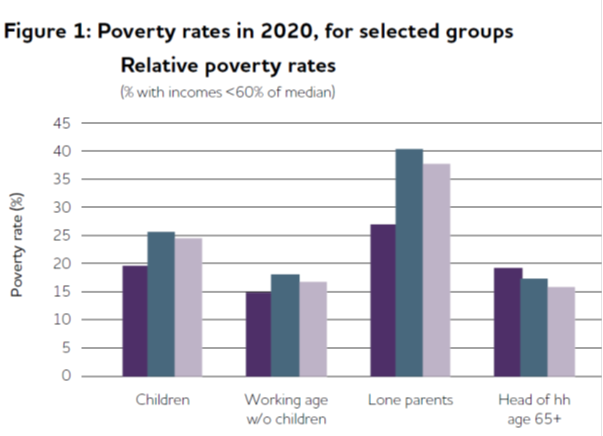 Poverty
Poverty 
Image from Bevan Foundation’s media library
Governments of all colours are maintaining their commitment to reduce poverty. Whether at Westminster or Cardiff Bay, the objective of ‘eradicating’ child poverty by 2020 is enshrined in law, and it would be a brave politician indeed who publicly dumped that aim.
Whether that aim is achievable is another matter. Already progress towards achieving the child poverty target has stalled, and the outlook for the economy for many years to come is tough. But rather than rely on a crystal ball and a hunch, Joseph Rowntree Foundation has done some ‘modelling’ of what the future might hold, the findings from which were showcased at our Welsh Labour Market 2020 conference yesterday.
There’s mixed news. The first is that the jobs outlook is not all gloom and doom – there is likely to be some modest increase in employment, mainly in professional and managerial jobs, and in addition there will be a lot of ‘openings’ (vacancies to you and me) as people move on e.g. to retire. There’re also predicted to be jobs at the bottom of the labour market too, especially in caring roles. So far, so good.
But these jobs, it seems, are not going to provide a route out of poverty. While being in work might mean an individual is better off than being out of work, the JRF’s work shows that overall, poverty is likely to increase quite substantially by 2020 for all groups of people as the graph below shows. (The purple column is 2009/10, the blue column is the 2020/21 forecast which takes the changes in employment into account, and the lilac column is the forecast if there were no employment changes).
So, despite a reasonably optimistic forecast on the jobs front, at least in terms of numbers, poverty is set to grow.
The JRF report then looks at what might offset the worst effects. Closing the gender pay gap maybe? No. Increasing the number of jobs outside London and the South East? Not really. Increasing qualifications? No. The levers that make the difference are taxation and benefits.
If these findings are right, they appear to leave the Welsh Government high and dry as they suggest that there is little that it can do to tackle poverty. But that’s not to say it can or should do nothing. Most obviously, the JRF forecasts are just that – forecasts. Even if they are correct, the Welsh Government faces a challenge making sure that the jobs are actually created and that people from Wales are equipped to fill them. Perhaps it might go one better and help to create even more jobs than are forecast!
The Welsh Government also needs to make sure it is speaking out about tax and benefits. It’s no good muttering that these are not devolved matters and are for the Westminster government. Non-devolved they may be, but the Welsh Government picks up the bill (and the flack) for the poverty that the tax and benefits system allows. Not only that, but the poverty that the tax and benefit system allows also makes achieving the Welsh Government’s objectives in devolved areas, such as education, much more difficult.
Rather than being in the margins of its agenda, tax and benefits – devolved or not – should be centre stage of Welsh Government policy.
Victoria Winckler is Director of the Bevan Foundation.




